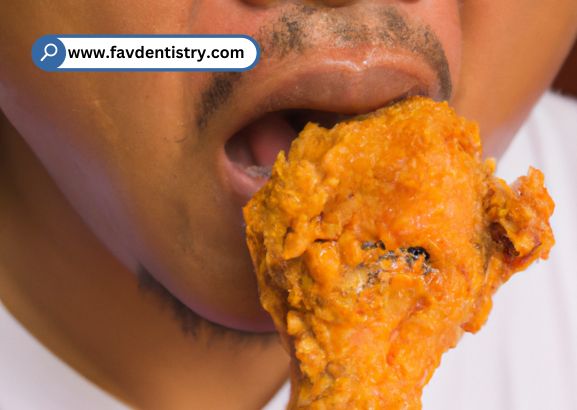Can You Eat Fried Chicken With Dentures : Tips for Safe Eating
Last Updated on 6 months by DR. ALBIN SIPES
Yes, you can eat fried chicken with dentures as long as you cut it into smaller pieces and chew carefully. Fried chicken can be enjoyed with dentures, but it’s essential to eat small, manageable bites and avoid biting directly into bones.
This will help prevent any damage to your dentures and ensure a comfortable eating experience. Fried chicken is a popular dish enjoyed by many people. Still, for those with dentures, there may be some considerations to keep in mind. Whether you’re a new denture wearer or have been wearing them for a while, it’s essential to understand how to eat certain foods without causing any harm to your dentures.
We’ll explore the topic of eating fried chicken with dentures, providing helpful tips and advice to help you enjoy this delicious meal without any worries.
Denture-friendly Diet Basics
Following a denture-friendly diet is essential for individuals who wear dentures to ensure comfortable eating and maintain overall oral health. Eating with dentures can present its challenges, but with the proper diet and eating habits, enjoying your favorite foods, like fried chicken, is still possible. In this section, we’ll delve into the basics of a denture-friendly diet, including understanding the challenges and the importance of diet selection and tips to make eating more comfortable for denture wearers. Let’s explore how you can continue to savor the foods you love while wearing dentures.
Understanding The Challenges Of Eating With Dentures
Eating with dentures can pose several challenges, including discomfort, reduced biting force, and the potential for denture slippage during meals. Sticky or tricky foods, like fried chicken, can be particularly challenging to consume. Denture wearers may experience difficulty in breaking down these foods, leading to potential discomfort and insecurity while eating.
The Importance Of Diet Selection For Denture Wearers
A well-thought-out diet is crucial for individuals with dentures. Choosing foods that are easier to chew and swallow can make mealtimes more enjoyable and reduce the risks of denture-related issues. A denture-friendly diet focuses on softer textures, meal-prepping methods, and food choices that are gentler on the gums and teeth, such as cooked vegetables, lean meats, and dairy products.
Tips To Make Eating Easier And More Comfortable
- Chop or slice foods into smaller, bite-sized pieces to aid in easier chewing and reduce strain on the dentures.
- Avoid overly crispy or complex textures that can place excessive pressure on the dentures.
- Consider enjoying fried chicken with boneless, skinless pieces to minimize challenging textures.
- Refrain from using excessive amounts of sauces or sticky condiments that may affect denture adherence.
- Take smaller, deliberate bites and chew slowly to allow for better food breakdown and easier digestion.
Selecting Denture-safe Foods
If you wear dentures, you may be wondering about the best foods to consume, particularly when it comes to enjoying favorites like fried chicken. Selecting denture-safe foods is essential to ensure comfort and prevent any potential damage to your dentures. This involves considering the texture and consistency of the food, as well as understanding which food types are recommended for denture users. By making informed choices, you can continue to enjoy a varied and satisfying diet while maintaining the longevity and comfort of your dentures.
The Texture And Consistency Considerations
When selecting foods to eat with dentures, it’s crucial to pay attention to the texture and consistency. Foods that are overly hard, sticky, or tough can put unnecessary strain on your dentures and may even cause damage. Conversely, soft and tender foods are generally easier to chew and gentler on your dentures. By being mindful of the textural properties of the food you consume, you can minimize discomfort and reduce the risk of denture-related issues.
Recommended Food Types For Denture Users
Several food types are particularly well-suited for individuals with dentures. Opting for softer meats, such as chicken, can be a great choice. When it comes to fried chicken, it’s best to remove the skin and bones to make it easier to chew and consume. Additionally, incorporating plenty of fruits, vegetables, dairy products, and grains, like rice and pasta, into your diet can help ensure a balanced and denture-friendly approach to eating.
Why Certain Foods Are Better Than Others
Certain foods are better suited for individuals with dentures due to their ease of consumption and minimal impact on the dentures themselves. Soft, tender, and well-cooked foods require less effort to chew, reducing the strain on dentures and the potential for discomfort. Moreover, including a variety of nutrient-rich foods in your diet can help support overall oral health and promote the longevity of your dentures.
Adapting Fried Chicken For Dentures
Enjoying fried chicken with dentures is possible with a few adjustments. Opt for boneless cuts and chew carefully to prevent dislodging the dentures. Pairing it with soft sides can also make the experience more comfortable. Remember to maintain good denture hygiene for long-term satisfaction.
Preparing Fried Chicken, That Is Denture-friendly
For individuals with dentures, enjoying fried chicken can still be a delightful experience with a few adaptations. When preparing fried chicken for denture wearers, it’s essential to consider the texture and ease of chewing. One way to make fried chicken denture-friendly is to ensure it’s tender and easy to bite into without causing discomfort or dislodging the dentures.
Alternative Cooking Methods To Traditional Frying
While traditional frying may result in a crispy and flavorful crust, it can sometimes pose challenges for denture wearers due to its hardness. Exploring alternative cooking methods, such as baking or air frying, provides a healthier and denture-friendly approach. These methods can maintain the desired crunch while being gentler on the teeth and dentures.
Nutritional Adjustments For A Balanced Meal
When enjoying fried chicken with dentures, it’s important to make nutritional adjustments to ensure a balanced meal. Pairing fried chicken with soft and nutrient-rich sides like steamed vegetables, mashed potatoes, or a refreshing salad can enhance the overall dining experience. This allows individuals with dentures to savor their meals while maintaining a well-rounded and satisfying diet.
Safe Eating Practices For Dentures
When it comes to wearing dentures, safe eating practices are crucial in ensuring comfort and preventing damage to your dental appliance. Whether you are a new denture wearer or have been using them for some time, adopting the proper eating habits can contribute to a positive experience. Below, we delve into the essential safe eating practices for denture wearers, focusing on chewing techniques, appropriate bite sizes, and the role of dental adhesives.
Chewing Techniques That Protect Your Dentures
Chewing techniques play a vital role in protecting your dentures from unnecessary wear and tear. To safeguard your dental appliance, ensure that you distribute the food evenly on both sides of your mouth before chewing. This not only aids in efficient digestion but also prevents excessive strain on a particular area of your dentures, potentially causing them to loosen or break. Additionally, practicing slow and gentle chewing motions can help maintain the stability of your dentures, making them less prone to dislodging during meal times.
Why Bite-Size Matters

Bite size matters significantly when it comes to eating with dentures. Opt for smaller, manageable bites rather than large, cumbersome ones. By doing so, you reduce the risk of dislodging your dentures while chewing. Cutting food into bite-sized pieces, especially when consuming more intricate textures, can enhance your eating experience and prevent potential damage to your dental appliance. Furthermore, smaller bites facilitate more controlled chewing, resulting in increased comfort and stability for denture wearers.
The Role Of Dental Adhesives While Eating
The use of dental adhesives can provide added stability and confidence while eating with dentures. For individuals who require extra support, applying a thin strip of dental sealant to the denture base can help secure the appliance in place during meal times. However, it is imperative to adhere to the manufacturer’s instructions and use the adhesive sparingly, as excessive application can lead to discomfort or difficulty in denture removal. Additionally, dental adhesives can be particularly beneficial when consuming sticky or challenging food items, offering a firmer grip and minimizing the risk of denture movement.
Can You Eat Fried Chicken With Dentures: Tips
Fried chicken is a delicious and popular dish enjoyed by many. Still, if you wear dentures, you may wonder if it’s possible to savor this crunchy delight. With the right strategies and modifications, you can still relish fried chicken while ensuring the security of your dentures. Here are some tips to help you enjoy fried chicken with dentures.
Strategies For Enjoying Fried Chicken With Dentures
When indulging in fried chicken with dentures, it’s crucial to approach it with care to prevent any discomfort or issues. Here are some helpful strategies:
- Cut the chicken into smaller pieces: Trimming the chicken into bite-sized pieces can make it easier to chew and reduce stress on your dentures.
- Chew slowly and mindfully: Take your time and chew your food thoroughly to avoid any potential strain on your dentures.
- Use the back teeth: Try to chew with your back teeth to distribute the force evenly and minimize pressure on your dentures.
How To Modify Classic Fried Chicken Recipes
Adapting traditional fried chicken recipes can enhance the dining experience for denture wearers. Consider these modifications:
- Choose boneless chicken: Opt for boneless pieces to avoid complications and make it easier to eat.
- Use a lighter breading: Consider a thinner breading or breadcrumbs to make the chicken more manageable and comfortable to chew.
- Bake instead of frying: Baking the chicken instead of deep frying can create a softer texture while maintaining the delicious flavor.
Ensuring A Satisfying Meal Without Compromising Denture Security
Enjoying fried chicken with dentures doesn’t mean sacrificing comfort. Follow these tips to ensure a satisfying meal without compromising denture security:
- Clean dentures before eating: Ensure your dentures are clean and adequately fitted before enjoying your meal.
- Stay hydrated: Sipping water while eating can help in the digestion process and make it easier to enjoy your meal.
- Consume small bites: Taking smaller bites can make it easier to chew and reduce strain on your dentures.
Maintaining Denture Health Post-meal
After enjoying a delicious meal, especially one that involves challenging foods like fried chicken, it’s essential to ensure the cleanliness and preservation of your dentures. Proper care and attention will help maintain the health of your dentures post-meal, allowing you to continue enjoying your favorite foods without compromising your oral health.
Cleaning Dentures After Eating Challenging Foods
When it comes to eating foods that are particularly sticky, hard, or require rigorous chewing, it’s essential to clean your dentures meticulously post-meal. This will help prevent any debris or food particles from accumulating and causing discomfort or potential damage to your dentures.
- Rinse your dentures thoroughly with water to remove any large food particles.
- Gently brush your dentures using a soft-bristled brush and mild soap or denture cleaner, ensuring you reach all surfaces, including the gaps and underneath areas.
- Rinse your dentures once more to remove any remaining cleaning solution or residue.
- Store your dentures in a clean and dry container to prevent bacterial growth and maintain their shape.
Routine Care To Extend The Life Of Your Dentures
Proper routine care is essential to extend the life of your dentures and ensure they remain in optimal condition. Incorporating regular maintenance practices will help you enjoy your meals without worrying about the impact on your dentures.
- Remove and rinse your dentures after each meal to prevent the accumulation of food debris.
- Brush your natural teeth, gums, and tongue with a soft-bristled brush to maintain overall oral hygiene.
- Soak your dentures in a denture cleaning solution or water overnight to keep them fresh and clean.
- Handle your dentures with care, avoiding any excessive force or pressure that could lead to damage.
When To Consult A Professional For Denture Adjustments
Suppose you experience any discomfort or irritation or notice changes in the fit or functionality of your dentures. In that case, it’s crucial to seek professional assistance for adjustments. Waiting too long to address issues can lead to further complications, so it’s essential to consult a dentist or prosthodontist at the earliest signs of discomfort or changes in your denture fit.
Conclusion
Eating fried chicken with dentures is possible with caution and care. A few adjustments can make the experience enjoyable, like cutting the meat into smaller pieces and using a suitable adhesive. With proper maintenance and habits, you can still enjoy the occasional indulgence of fried chicken.
Remember to consult your dentist for personalized advice.


